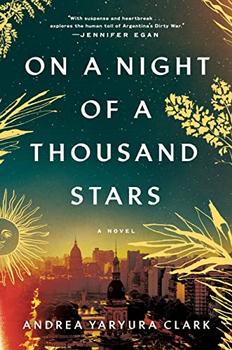Page 6 of 6
There are currently 44 reader reviews for On a Night of a Thousand Stars
Write your own review!
Molly O. (Centennial, CO)
A Book of a thousand details
On a Night of a Thousand Stars belongs to a subgenre of historical fiction that toggles between two parallel narratives – set in the past and the present – which play off each other to reveal the horrors that occurred in Argentina's recent past. While I particularly enjoy this way of storytelling, both narratives were sadly bogged down with excruciatingly detailed descriptions of people, locations…everything. This impeded the movement of the plot and detracted from any suspense the author was trying to create. While I wanted to cheer for Santiago and Valentina's love affair, I found their relationship to be
…more callow and not well developed. I did, however, thoroughly enjoyed the history of this time in Argentina and felt well-educated about the political turmoil of those times, something I knew little about. (less)This dual timeline historical novel tells the story of Argentina from the early 1970s through the mid 1980s, prior to the military dictatorship and when people were disappeared through a law student and then in 1998 through his daughter. I was interested in the place and what happened and I found the first timeline much more interesting, although I am still not too sure of which government was better for the citizens (or neither?). Santiago is privileged and falls deeply in love with Valentina, but marries Lila. He would prefer to keep his student days a secret. His daughter Paloma seems happy enough, but goes
…more digging into the past, uncovering secrets she is not sure she wants to know. She is not really all that interesting and Franco, whose parents were disappeared and murdered, is not all that interesting either. In the end, this was probably not the book for me. (less) Donna W. (Wauwatosa, WI)
On A Night Of A Thousand Stars
Donna W. (Wauwatosa, WI)
On A Night Of A Thousand Stars
I didn't know much about the history of Argentina, and this book opened my eyes to this era. History lovers will read this book with interest. Unfortunately, for me, the character development was rushed, and I never connected with any of the main characters. There were also many extra characters that I found hard to keep track of. Switching back and forth between time periods also didn't help the flow.
The book was written with a feeling of excitement, and I do think it portrays this dark period well. I would probably give it 3 1/2.
Myrna M. (Chapel Hill, NC)
The Stars Don't Twinkle
As a writer, I am hesitant to express negative thoughts about the work of another writer. So I will begin this review with one positive: the background of this book is one that needs to be told and retold. The history of political unrest of Argentina in the 1970s; the resultant abuse of those citizens who resisted the policies of those in power, beginning with Peron and the stories of the "disappeared" have, in practicality, disappeared from our consciousness. I am grateful to Clark for having brought it to the forefront—it is a story that could well serve as a warning to all peoples about what happens when
…more autocracy rules.
However, and this is a big however for me, the romance that is the central theme of the book, one might say the heart, is told in language that is banal. The love scenes might be enjoyable for those in the 14-16-year old range, but the words don't ring true. I found throughout the book that I was bored by language that was describing emotions; they were stodgy and stiff. Additionally, the reader would intuit immediately that Santiago's mother would prevent his letters from reaching his love, of whom his mother disapproved because of her "lower" station in life. Where there should have been tension, there was none.
I hope Ms Clark has an opportunity to rewrite this story. With a good editor, it could be an important book. (less)
